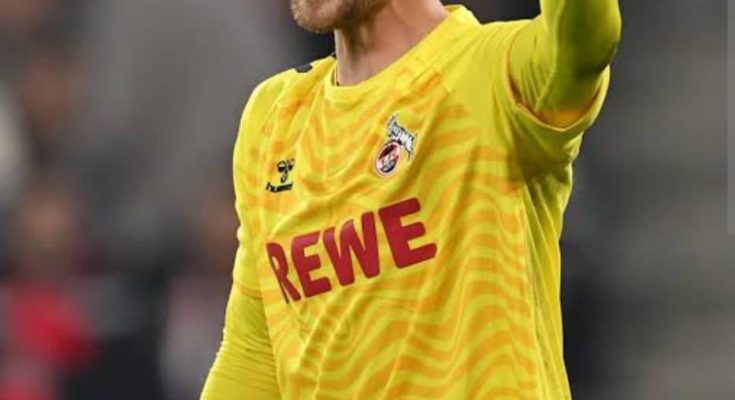In the often turbulent world of football transfers, where staggering sums and relentless bidding wars dominate headlines, a recent development in the Bundesliga has sent shockwaves through the football community. Marvin Schwäbe, the Cologne goalkeeper whose steady performances have earned him recognition, has turned the transfer market on its head in a manner so unexpected, it challenges the fundamental economics of modern football.
It all began with Bayer Leverkusen’s audacious move. The club, known for its aggressive approach in the market and ambition to claw their way into the upper echelons of German football, placed a mega offer on the table to acquire Schwäbe. The figure was astronomical, pushing well into the multi-millions, a sum that, under normal circumstances, would have been irresistible for most players and clubs alike. Yet, in a stunning twist, this mega offer was flatly rejected—not just by the player’s current club, 1. FC Köln, but by Schwäbe himself. This decision alone is a seismic event in today’s football landscape, where money often trumps loyalty, vision, and long-term planning.
For years, the narrative has been dominated by the pursuit of financial gain. Players, agents, and clubs are often perceived as mercenaries, driven by lucrative contracts and signing bonuses. The conventional wisdom suggests that if a club throws enough money at a player, resistance will crumble. Yet Schwäbe’s choice to stay in Cologne until 2030, despite the glittering financial allure from Leverkusen, disrupts this narrative and forces us to rethink the dynamics of loyalty, ambition, and the future of football careers.
Why does this matter? Because football, especially at the top level, is as much about the business as it is about the sport. Transfer fees have skyrocketed in recent years, fueled by lucrative broadcasting deals, global fanbases, and commercial endorsements. Clubs are under immense pressure to buy success, often at the expense of long-term stability. But Schwäbe’s decision underscores an emerging counter-trend—one where players prioritize stability, club culture, and personal growth over immediate financial gain.
To fully grasp the magnitude of Schwäbe’s decision, consider the context. 1. FC Köln is a club with a passionate fanbase and a rich history, but it has often struggled to compete financially with Bundesliga giants like Bayern Munich, Borussia Dortmund, and yes, Bayer Leverkusen. For years, Köln has been seen as a stepping stone, a place for players to showcase their talent before moving on to bigger clubs. Schwäbe himself was often viewed as a promising talent who might follow the same path.
Yet, by committing his future to Köln until 2030, Schwäbe is defying this expectation. This contract length is practically unheard of in modern football, where three- to five-year deals are the norm, and players regularly move clubs every few seasons. It signals an unprecedented level of faith in the club’s project, its vision, and its ability to develop and compete in the years ahead.
From Leverkusen’s perspective, this rejection is a bitter pill to swallow. Their offer was not only financially significant but also strategically designed to strengthen their squad depth and challenge for titles. Losing out on Schwäbe means recalibrating their plans, perhaps settling for less ideal alternatives, and rethinking their recruitment strategy. The ripple effects of this decision could shape the club’s trajectory for years to come.
The broader football community is also taking notice. Analysts, pundits, and fans alike are questioning what this means for the sport’s transfer culture. Are we witnessing the birth of a new era where players are more inclined to commit long-term to clubs that align with their values rather than simply chasing money? Could Schwäbe’s choice inspire others to prioritize loyalty, stability, and sporting ambition over the financial treadmill that often dominates football?
Moreover, Schwäbe’s stance challenges clubs to rethink their approach to player relations. Modern football’s hyper-commercialized environment can sometimes reduce players to mere assets, commodities to be bought and sold at will. Schwäbe’s contract renewal is a powerful reminder that footballers are individuals with deep connections to their clubs, communities, and personal aspirations. It calls for a more humane, respectful approach to transfers and negotiations.
Of course, financial considerations remain paramount. The football economy is enormous, and clubs must balance books while aiming for success. But Schwäbe’s example shows that money is not always the decisive factor. Personal fulfillment, career satisfaction, and belief in a club’s future can weigh just as heavily—if not more—in a player’s decision-making process.
This decision also resonates on a human level. Imagine the pressure on Schwäbe—turning down millions, facing scrutiny from media and fans, and committing to a long-term future in a competitive and uncertain environment. It speaks to a deep sense of purpose and courage, traits that are increasingly rare in a game often associated with glamour and quick gains.
In the months following this announcement, 1. FC Köln has rallied behind Schwäbe. The club’s leadership sees this as a cornerstone moment, a signal that their vision is attractive enough to retain key talents against stiff competition. Fans have embraced their goalkeeper not just as a player, but as a symbol of loyalty and ambition. The stadium chants echo a renewed belief in the club’s potential.
Meanwhile, Bayer Leverkusen is left to navigate a transfer window without their prime target. The failure to secure Schwäbe may force them to adapt quickly, exploring alternative signings or investing in youth development. Their approach to transfers might become more measured, focusing on building cohesive squads rather than blockbuster signings.
This Bundesliga saga serves as a microcosm of football’s evolving landscape. It challenges the notion that money alone dictates success and highlights the growing importance of intangible values like loyalty, identity, and long-term vision. Schwäbe’s choice is a beacon for players and clubs alike, reminding the football world that beneath the flashy transfers and headline-grabbing sums, the heart of the game beats strongest where commitment and belief reside.
Looking forward, one wonders what this means for the Bundesliga and beyond. Will other players follow Schwäbe’s lead, forging long-term bonds with clubs that share their ethos? Will clubs invest more in cultivating environments where players want to stay and grow? Could this herald a shift away from the relentless churn of transfers that disrupt team cohesion and fan attachment?
As the 2020s progress, football’s commercial juggernaut shows no signs of slowing. Yet amidst this, stories like Schwäbe’s remind us of football’s enduring power to inspire, connect, and transcend mere business transactions. They tell us that, at its core, football is a game of passion, loyalty, and dreams—values that no amount of money can buy.
In conclusion, Marvin Schwäbe’s decision to reject Bayer Leverkusen’s mega offer and commit to Cologne until 2030 is more than just a transfer story—it’s a paradigm shift. It exposes the limits of money-driven transfers and elevates the importance of long-term vision, player identity, and club culture. For fans, players, and clubs, this twist is a powerful reminder that the beautiful game still belongs to those who dare to choose loyalty over cash, passion over profit, and faith over fleeting fortune.
The Bundesliga—and indeed world football—will be watching closely to see if Schwäbe’s bold move sparks a wider transformation. For now, the Cologne keeper stands tall, a symbol of hope and a testament to what football can be when heart and mind unite. His story has already shaken the foundations of modern football—and perhaps, it’s just the beginning of a new chapter.



